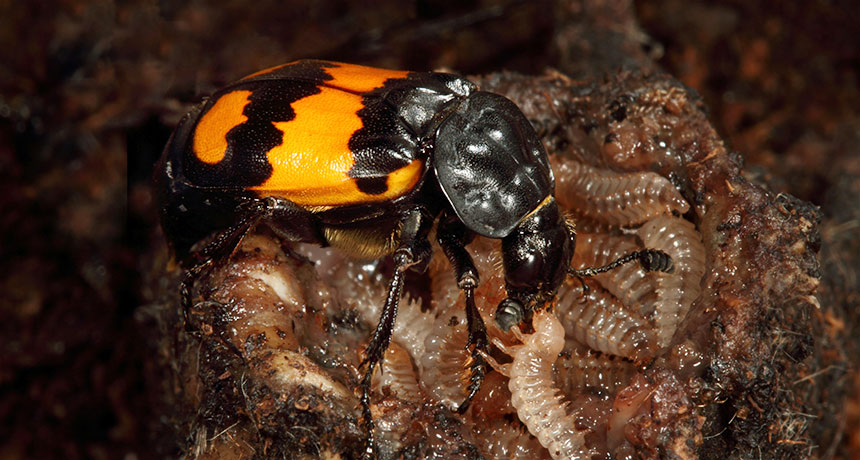Female burying beetle uses chemical cue to douse love life

For burying beetles, parenting is a real turnoff.
While caring for her newborn larvae, a mother burying beetle (Nicrophorus vespilloides) releases a chemical compound that limits her mate’s urge to breed. The antiaphrodisiac cue lets beetle dads focus on childcare before mating again, researchers report March 22 in Nature Communications.
“We were surprised to discover such a chemical communication system that helps to resolve — at least in part — conflicts between both parents,” says study coauthor Sandra Steiger, a behavioral ecologist at University of Ulm in Germany. “Communication plays a key role in effective parental care.”
Burying beetles lay their eggs on small dead animals. For about three days after hatching, larvae beg their parents for predigested food (nibbled from the carcass). Previous studies showed that beetle parents refrained from sexual activity — and that female beetles released a gas — during this period.
The researchers determined that this gas was a compound called methyl geranate. Mother beetles released the chemical while caring for a begging brood, producing more if they had more larvae. (Female beetles physically separated from their larvae produce little to no chemical cues.) Methyl geranate acted as a buzzkill for male beetles; as females produced more of the compound, males made fewer attempts to mate.
Methyl geranate probably benefits larvae by allowing attentive parenting, the researchers say. Mating attempts would distract from tending to needy larvae, which grow and survive better with parental care. The female “can give the signal to the male: ‘OK, now it’s time to focus on caring and forget about sex,’” says behavioral ecologist Stephen Trumbo of the University of Connecticut in Waterbury.
The antiaphrodisiac could benefit adult beetles, too. While caring for her young, a mother burying beetle undergoes a hormonal shift that makes her less fertile, the team found. Mating attempts during this time wouldn’t just be distracting, but also a waste of energy.
Trumbo says the study provides a rare glimpse into how male and female invertebrates coordinate childcare. “It can benefit both the male and female, because they’re going to achieve higher reproductive success if their mating behavior and parental behavior is well-coordinated and well-timed.”